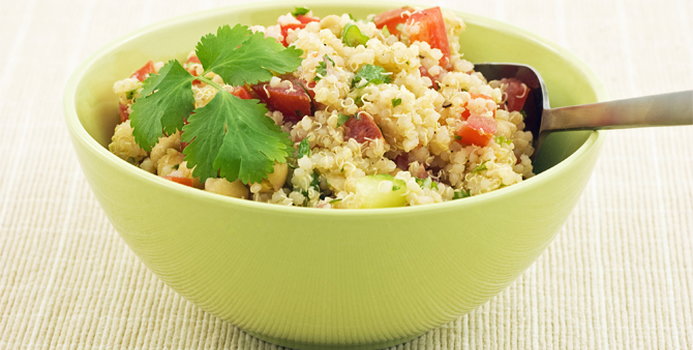Quinoa is often referred to as a superfood because it's packed with essential nutrients and can provide you with health benefits. In ancient Incan culture, quinoa was considered sacred and called the mother of all grains. Because of its high protein content and other nutritional benefits, quinoa is one of the most nutritious grains available.
Protein in Quinoa
Quinoa is one of the few grains that are sources of complete protein, notes to the Academy of Nutrition and Dietetics. Therefore, adding quinoa to your diet is a way to obtain high-quality protein that provides your body with all of the essential amino acids it needs daily to function properly. One cup of cooked quinoa contains just over 8 grams of protein, according to the U.S. Department of Agriculture's National Nutrient Database for Standard Reference. The protein recommended dietary allowance (RDA) is 56 grams for men and 46 grams of protein daily for women.
Other Important Essential Nutrients
One reason quinoa is referred to as a superfood is because in addition to being rich in protein, it's packed with carbohydrates -- including lots of fiber -- healthy fats, vitamins and minerals. One cup of cooked quinoa provides just over 5 grams of fiber and is rich in calcium, iron, potassium, phosphorous, magnesium, zinc, folate, vitamin E, and B vitamins.
Gluten-Free Benefits
Not all grains are gluten-free, but because quinoa doesn't contain gluten, it's a nutritious addition to the diets of people with Celiac disease, wheat allergies, or gluten sensitivities. While there's not a blood test to determine if you have gluten sensitivity, people with this condition may experience depression, abdominal pain, diarrhea, bloating, constipation, difficulty concentrating, headaches, chronic fatigue, bone pain or joint pain, according to the Celiac Disease Foundation. These symptoms often subside after beginning a gluten-free diet, and return when gluten is reintroduced.
Potential Health Benefits
Because quinoa is rich in fiber and other essential nutrients, consuming it on a regular basis may provide you with health benefits. Fiber is known to help lower high blood cholesterol levels, which can reduce your heart disease risks. A review published in 2011 in The Journal of Nutrition found that whole grains, such as quinoa, may help lower your risk for diabetes, heart disease and cancer -- and can aid in healthy weight management. Another review published in 2011 in Nutrition Reviews suggests that replacing refined carbohydrates, such as white rice, with whole grains like quinoa may help reduce type 2 diabetes and heart disease.
How to Incorporate Quinoa into Your Diet
Quinoa is a versatile whole grain that you can add to a variety of healthy dishes. Try eating cooked quinoa with grilled chicken or salmon and your favorite vegetable. Add quinoa to cold salads, soups, casseroles and stir fries. Try eating quinoa for breakfast in place of oatmeal, and top it with fruit and almonds. Bake with gluten-free quinoa flour instead the flour you normally use. Eat veggie burgers that contain quinoa as an ingredient, or make a quinoa protein-rich smoothie -- by blending quinoa with fruit, nut butter, and soy milk, low-fat cow's milk or yogurt.
Artificial Sweeteners and Their FDA Safe Levels
An experienced health, nutrition and fitness writer, Erin Coleman is a registered and licensed dietitian and holds a dietetics degree from the University of Wisconsin-Madison. She also has worked as a clinical dietitian and health educator in outpatient settings. Erin's work is published on popular health websites, such as TheNest.com and JillianMichaels.com.




